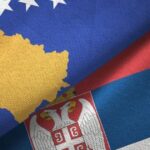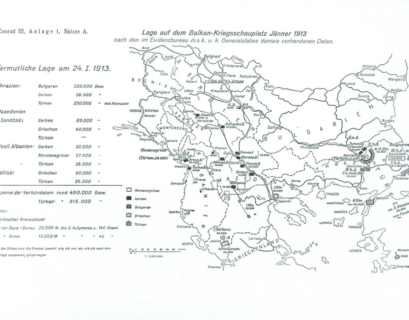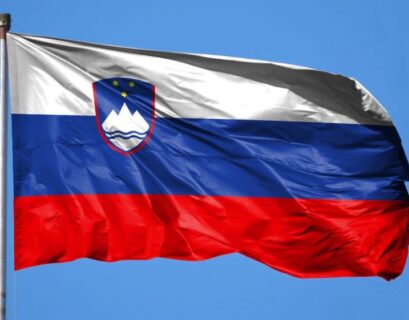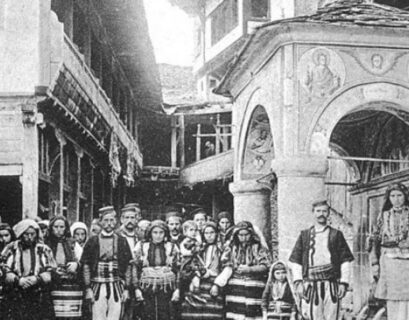By Elidor Mëhilli
In his recently published book Stalin and the Fate of Europe: The Postwar Struggle for Sovereignty, Norman Naimark, one of the world’s foremost historians of Communism, looks comparatively at the imposition (or not) of Communist regimes in various European settings.[1] These range from the Danish island of Bornholm and the Soviet involvement in Finland to internal conflicts in Italy, Germany, Poland, Austria, and Albania. In some of these places, Soviet troops were on the ground already at the end of the war and so the question becomes why they left when they did. In others, however, Moscow was a distant actor. Post-Second World War Albania falls into this latter category. This diversity of conditions and outcomes is important because it demonstrates the limits of viewing Soviet power in Europe after the Second World War as a purely external imposition. It also reminds us of the value of thinking comparatively when assessing postwar geopolitics and the early stages of the Cold War.
Seen from the Albanian perspective, Naimark’s study is also an invitation to consider the cast of actors involved in each case, and assessing the pressures they faced with an open mind. What seemed possible and to whom? How open-ended was the situation, say, in mid-1945 or the first half of 1946? To put it another way, how long did it take for the firmness of postwar politics to take shape in each of these cases? Although timelines might be different from place to place, patterns nevertheless emerge. Beyond the issue of the origins of the Cold War, looking at the postwar moment with fresh eyes can also help rescue Albanian national historiography from provincialization.
When analyzing Albania in the immediate years after the Second World War, the range of geopolitical constraints becomes evident, as does the fallibility of individual actors when confronted with these constraints. Specifically, when it comes to Albanian-American relations between 1945-1946, it becomes necessary to disentangle the ground-level view of the postwar period from later official Communist-era myths. This is the focus of this essay.
The Problem
For the Albanian Communist leaders in the early years, Yugoslav backing seemed essential, although Belgrade would later exaggerate its role and the Albanian party leadership – embarrassed by its Yugoslav ties once bilateral relations had soured – would vehemently deny it. After the country’s liberation in late 1944, some Yugoslav advisers did help shaping the party’s structure and they also become involved with economic planning. Belgrade agreed to supply aid in return for Albanian goods. A number of joint companies were set up to cover the construction of railroads, oil, mining, electricity, navigation, and trade. Belgrade also urged closer coordination in currency policy. The path to economic and political integration between the two countries seemed open. Yugoslavia’s leader Josip Broz Tito clearly had the upper hand.
Heading Albania’s party was Enver Hoxha (1908–1985), a teacher-turned-activist who spent his student years in France and Belgium, later joining the Communist ranks at home. Hoxha lacked the revolutionary credentials of someone like Mehmet Shehu, an experienced military man who had participated in the Spanish Civil War. His wartime contributions were no match for Shehu’s. Neither was Hoxha widely known in the early 1940s. Still, he lacked neither cunning nor charisma and above all he had political instinct. At delicate moments, he was particularly adept at presenting himself as an arbiter among competing sides. In this way he quickly came to dominate the party’s inner circle, which included members who were intellectually more impressive.
After the war, Hoxha was party secretary but also served as Prime Minister, Minister of Foreign Affairs, Minister of Defense, and Commander in Chief. (He would be forced to relinquish government posts after Stalin’s death, when high-ranking officials in Moscow demanded changes.) The higher echelon of the Central Committee consisted of other former fighters, tested in battle and trusted for their personal loyalty rather than their level of education or ideological literacy. Indeed, the ideological training came after the Communist seizure of power. The party’s upper tier was largely unschooled, as was most of the country’s populace. The figures surrounding Hoxha were relatively young and inexperienced in government. They believed that a world-defining war had placed them on the right side of history. But like Hoxha, they cut their teeth in the ups and downs of the relations with more powerful foreigners in the 1940s.
How Hoxha maneuvered with more powerful foreigners in 1945-1946—not only the immediate neighbor Yugoslavia, but also the Soviet Union and the United States—is highly instructive. Understanding the importance of Belgrade’s support, he had agreed to postpone settling the thorny issue of Kosovë/Kosovo and its Albanian majority population. The idea was that the region’s future would be settled within a postwar international arrangement. Careful not to alienate his Yugoslav counterparts, Hoxha was nevertheless hardly blind to the unequal nature of this relationship, and so he desperately sought direct ties to Moscow in 1946. In the meantime, the fledging regime kept up the anti-American line through the press and popular organizations.
Stalin initially approved of Yugoslavia’s “handling” of its smaller and poorer neighbor. Albania’s rulers simply had to go along with this arrangement. “Stalin demonstrated little interest in Albania,” explains Naimark in his book, and the idea of a reconstituted independent Albania was not a Soviet priority. Some of Stalin’s inferiors in fact considered the possibility that chunks of Albania might become part of Yugoslavia, while other parts might be attached to Greece.
Naimark cites a February 1945 Soviet foreign ministry report, authored by Maxim Litvinov, who was deputy minister for foreign affairs, speculating that either the British (along with Greece) would insist to have Albania on their camp, or the Yugoslavs and the Greeks “would partition the country between them.” Stalin’s objective at this point was to avoid complications with the Western Allies; going along with Belgrade’s efforts in Albania would serve this purpose in the short term.[2] Of course, how one perceived Moscow’s tactical neglect depended on one’s specific geopolitical circumstances.
The recognition
In this context, Soviet recognition of Albania’s regime in November 1945 was critical for the Albanian leader and his comrades. As far as the Americans and the British were concerned, the guidance was to wait and see how the situation unfolded on the ground. The American representatives in Tirana noted how the local press prominently covered the Soviet recognition of the government, including Hoxha’s grateful reply to Moscow. They also noted how carefully the Albanian regime was handling the publication of the Soviet notes compared to the British and American ones. “General feeling of population seems one of relief,” noted one such message to Washington, “that uncertainty has been removed and independent status of Albania as a country.”[3]
Joseph E. Jacobs, the US representative to Albania, had arrived in the country on Victory in Europe Day. He quickly took stock of the local scene. “I wish to add that I am laboring under no illusions,” he wrote to Washington in reference to the local Communist officials, shortly after his arrival. “They are as I have described in my telegrams a sincere, patriotic group of individuals who are going to be difficult to deal with. They are ignorant of the science of government, know little of international relations, and are highly sensitive over the fact that, after fighting a common enemy, they have as yet failed to receive any recognition except from Yugoslavia and possibly secret sympathy from the Soviet Union.” The relations between these three countries, Jacobs admitted, “are as yet an enigma to me.”[4]
Would American recognition be forthcoming? Aware of the importance of this move, the Americans insisted on a number of conditions. These were relayed to the Albanian side—“conditioned on assurance that genuinely free elections will be held, all democratic groups and candidates fully safeguarded and that foreign correspondents may enter Albania and report freely on elections.”[5] In addition to the important issue of free elections, problems related to freedom of assembly and press would come up repeatedly in the cables sent to Washington, especially as the internal situation in Albania evolved over the early months of 1946.
In the elections of December 1945, Communist candidates and sympathizers ran as part of the Democratic Front organization, a successor to the National Liberation Movement, which they were at pains to present as a broad-based organization. Almost all the candidates on the ballot were members of the Democratic Front, and they campaigned in the name of that organization rather than the Communist Party. The idea was not to scare off voters, who may have balked at talk of radical action.
Still, party officials worked hard to denigrate alternatives to the Front. They did not seek merely votes but verbal commitment and identification with a new social order, casting promises of support for the Front as votes for the “democrats” and hints of wavering as helping the “Fascists” and “foreign-inspired” forces. Desperate for currency, the government nevertheless mobilized anti-Fascist women and youth groups to do canvassing. The chiefs of the various religious communities urged their followers to vote for the Front. The party apparatus carefully screened candidates, engaged local informants, collected rumors, and insisted on door-to-door agitation. The result—a decisive Front victory—does not appear all that surprising given this context.
There is irony to the fact that Hoxha would later make villains out of the Americans present in Albania at this time. In fact, Jacobs, who observed the elections, reported favorably on them to Washington. His opinion was that the country had fulfilled this particular obligation: “Election was conducted by secret methods without evidence of threats or intimidation and, although opposition presented no candidates, it could have done so. Moreover in absence of opposition candidates regime in order to give opposition opportunity to register dissent provided special ballot box for that purpose at every polling booth similar to box for Front candidates. Of 603,000 registered voters 543,000 or 90% cast ballots 93% for and 7% against Front candidates. Assumes that all 10% abstaining voters were against regime, Front would still have 84% of all registered voters.”[6]
As we now know thanks to the availability of archival records and the work of a younger cohort of Albanian historians, the reality of the elections in 1945 was a lot messier than Jacobs relayed at the time. What might have seemed like “choice” from the outside was a kind of choreography. Much of the groundwork had been laid well before people showed up at the polls.
The stalling
Then there was the outstanding issue of the prewar treaties, which Edward J. Sheehy has rightly called an “imbroglio.”[7] The US had set an additional condition that Albania honor the treaties that had been effective on the last day of Albanian independence in 1939. Hoxha appeared both offended and puzzled. He initially reported that treaties prior to 1939 could not be located, and that he therefore was unable to reply to the American note. The problem then dragged on for months, as the Albanian side stalled and the Americans grew more and more exasperated with the local treatment.
Hoxha saw himself as a winner in a crucial historical moment—his country having been on the right side of a reordering of Europe. Why were the Americans expecting more than the Soviets? (Of course, the Soviets did not have prewar treaties with Albania, so that point was irrelevant.) For his part, Jacobs correctly understood, from conversations held with Hoxha in late 1945, that this issue might well lead to a deadlock—a kind of convenient stalling technique that allowed Hoxha some room to navigate possible alliances and air out his grievances vis-à-vis the West.
In fact, by the end of January 1946, the American envoy detected “growing unfriendliness of regime here toward US and possible fundamental changes going on in Govt itself.”[8] In the meantime, Soviet presence seemed to be expanding in Tirana. There was a lot of back-and-forth over the treaty problem in 1946, but these exchanges merely concealed ever-deepening distrust between the two sides. “Said we should trust his Government,” noted Jacobs on the occasion of one such exchange, “but I replied it was not matter of trust as in view recent developments here most-favored-nation agreement and naturalization treaty were more important to us than ever.”[9]
By the end of February 1946, Jacobs was cabling Washington that if Albania would not be favorably treated at the international level, it might well be looking at incorporation into Yugoslavia. “Is clear Albania has become nothing more than satellite state Soviet Union and Yugoslavia,” he wrote, “with probability only interest those two countries have in maintenance independent Albania is hope it may eventually be admitted UNO and thus add another vote Soviet bloc. If at next session UNO Albania not admitted, Albania may become unit Yugoslav federation.”[10] Indeed, later that summer, the two countries signed a Treaty of Friendship, Cooperation, and Mutual Assistance. Hoxha paid a visit to Belgrade and the pro-Yugoslav propaganda went into full force domestically.
By spring, Jacobs wrote about a regime that “has now gone all out for one party system which ruthlessly crushes all opposition” and asked the State Department to ask for “strong guarantees” for freedom of speech and of the press.[11] Relations with the British also significantly deteriorated between the spring and autumn of 1946, as the so-called Corfu Channel incident—in fact, a series of incidents—took place.[12]
Albania was vulnerable. Though Jacobs fretted that it was a “satellite state” of the Soviet Union, in reality Hoxha struggled to get Moscow interested in a small country located in a volatile region. Obsessed as the Cold War literature is with captivity and takeovers, it has missed this particular condition of vulnerability—which Naimark captures so well in his book—and the urgency of seeking out an external defender. The Albanian party boss tried to get such Soviet commitments, but they were not forthcoming. Caught between Yugoslav interests, Soviet neglect, and American suspicion and confusion about the internal state of affairs, the Communist party boss was faced with a balancing act. When he met with Molotov in Paris in September 1946, as Naimark notes, he was told that it would be best for Albania to reach agreements with the United States and Britain first, before any visit to Moscow.[13] (The first visit to Moscow would come the following year, in July, and it was a major feat for the Communist regime.)
By then, however, the resentment directed at the American representatives had reached a high point. Working conditions for the American envoys in Tirana also had become increasingly tough. The local press took aim at Western powers refusing to acknowledge its regime, and the radio station blasted warnings about territorial dangers emanating from Greece. Finally, after repeated complaints about harassment from the envoys in Tirana, Washington decided to withdraw the mission, in a dramatic evacuation-at-sea episode—worthy of a Netflix movie—in November 1946.
The myths
In later accounts, Hoxha fantastically presented the Anglo-American involvement in Albania during the Second World War as seamlessly connected to the “plotting” of American representatives in 1945-1946. In fact, Albania had confounded both the Brits and the Americans, but there was no place for confusion in Hoxha’s mythology. The conspiratorial mindset necessitated a blurring of the different personalities who had come to Albania. The wartime envoys, Hoxha explained, were replaced by “the missions of the British General Hodgson and the Americans Jacobs and Fultz, Anglo-American missions which had as their objective to organize the political opposition, economic interference through UNRRA [United Nations Relief and Rehabilitation Administration] and sabotage of the reconstruction of our country.”[14]
The mention of Harry Fultz is key here. Fultz had been involved in Albania before the Second World War, had fallen in love with the struggling and poor country, and had become a mentor to a group of local youths who had studied under him at the technical school set up in Tirana. In the official party narrative, this link became a nefarious one: The American civilian mission had included Fultz who was said to be “the old American agent in Albania.”[15] In fact, Fultz had been deeply committed and optimistic about Albania’s prospects, more so than some of his American colleagues. But the fact that he had been present in Albania before the war became a convenient tool for a conspiracy.
Thus, later in 1946, authorities launched a witch-hunt to “unmask” local plotters and collaborators who had supposedly worked with the Americans—Fultz in particular—against the Communist regime. Authorities arrested a number of engineers and technical staff, put them on trial, accusing them of sabotage in a land reclamation project in Maliq, in southern Albania. The sabotage story was concocted in parallel with the diplomatic debacle with the American representatives in Tirana. Fultz was said to have conspired with these contacts against the Albanian regime. This tale of sabotage was absurd and tragic. If UNRRA and the Americans had wanted to sabotage work in Albania, surely they could have just cut off supplies to the country? Why go through all the trouble of secret meetings and espionage?
No matter. “The mask was torn from Fultz, that ‘authority’ on Albania, who was defeated along with them,” boasted one of Hoxha’s later volumes. “Several of his former ‘pupils,’ who, on his instructions, had long been carrying out sabotage,” he wrote, “were uncovered.” The public trial, in this fictionalized telling of 1946, “was a great blow to the American mission and especially to Fultz. Jacobs and Fultz were terrified and they left Albania before the trial of the saboteurs at the Maliq swamp began. Some members of the American mission remained to follow the events.”[16]
The problem of the American recognition of the Communist government became retroactive evidence, in this later narrative, of a pre-existing anti-Communist conspiracy. “These were allegedly peaceful, allied missions, which were ‘to inform’ their governments ‘about the development of the situation in Albania,’ ‘about the level of democracy’ which would be established in this country, and about the character of the reforms which the new Albanian government would carry out, in order to ‘prepare’ its recognition by the British and American governments.”[17]
Hoxha’s fantastical account of 1946 was also made possible by the fact that there were Anglo-American efforts in the 1950s to overthrow the regime. These ill-fated covert operations included parachuting agents trained abroad so that they could foment a rebellion, dropping leaflets urging resistance, and broadcasting clandestine radio programs. They failed miserably, and the infiltrators ended up being put on trial and humiliated in public. One British observer, who had served as a liaison during the war, wrote that these missions merely boosted Hoxha’s “long-standing propaganda line about the hostility of the capitalist powers and their nefarious intentions.”[18] But it remains important to carefully disentangle the timeline of retroactive projections and the actual events and perceptions on the ground in 1946.
There were non-Communists and anti-Communists in Albania in 1946. There were small (and poorly organized) efforts to envision a different future for the country. But by the end of the year, those had been methodically eliminated, and the vision of the future had drastically narrowed. Some locals had looked to the Americans with hope, just as there were plenty who looked to the Soviet Union with hope, while Western recognition was not forthcoming.
However, the regime that had emerged out of the 1945 elections, and which brutally solidified its hold throughout 1946, was not the kind that was interested in having any opponents. Not everyone understood this crucial element of this regime right away, but it became impossible to miss by the end of the year.
Albanian-American Relations – Past, Present and Future
Commemorating the 30th anniversary of the re-establishment of official relations between the United States and Albania
June 2021
Elidor Mëhilli is Associate Professor City University of New York.
[1] Norman M. Naimark. Stalin and the Fate of Europe: The Postwar Struggle for Sovereignty (Cambridge: The Belknap Press of Harvard University Press, 2019).
[2] Naimark, Stalin and the Fate of Europe, p. 55, citing Litvinov to Molotov, “Al’banskaia Problema,” 8 February 1945, AVPRF, F. 06, Op. 7, D. 173, Ll. 110-111.
[3] Fultz to Secretary of State, 15 November 1945, 875.01/11–1545, FRUS: Diplomatic Papers, 1945, Vol. IV, Doc. 52.
[4] Jacobs to Secretary of State, 26 May 1945, 875.00/5–2645, FRUS: Diplomatic Papers, 1945, Vol. IV, Doc. 24.
[5] Fultz to the Secretary of State, 10 November 1945, 875.01/11–1045, FRUS: Diplomatic Papers, 1945, Vol. IV, Doc. 50.
[6] Jacobs to Secretary of State, 11 December 1945, 875.00/12–1145, FRUS: Diplomatic Papers, 1945, Vol. IV, Doc. 60.
[7] Edward J. Sheehy, “Albanian-American Relations in the Fall of 1946: A Stormy End,” Tirana Observatory, 9 April 2019.
[8] Jacobs to the Secretary of State, 29 January 1946, 711.75/1–2946, FRUS: Diplomatic Papers, 1946, Vol. VI, Doc. 1.
[9] Jacobs to Secretary of State, 28 February 1946, 711.75/2–2846, FRUS: Diplomatic Papers, 1946, Vol. VI, Doc. 8.
[10] Jacobs to Secretary of State, 28 February 1946, 711.75/2–2846, FRUS: Diplomatic Papers, 1946, Vol. VI, Doc. 8.
[11] Jacobs to Secretary of State, 20 April 1946, 875.00/4–2046, FRUS: Diplomatic Papers, 1946, Vol. VI, Doc. 11.
[12] On 15 May 1946, two Royal Navy cruisers travelling through the channel between Corfu and Albania were fired upon by artillery in Albania. Then, on 22 October 1946, British ships struck mines while passing through the Channel. There were forty-four casualties in this incident. British ships later returned to the channel to investigate and clear mines in Albanian waters, a third incident that led to an important ruling by the International Court of Justice on sovereignty and territorial waters.
[13] Naimark, Stalin and the Fate of Europe, p. 62, citing Molotov diary entry for 16 September 1946.
[14] Enver Hoxha, The Anglo-American Threat to Albania: Memoirs of the National Liberation War (Tirana: “8 Nëntori,” 1982), p. 352.
[15] Hoxha, The Anglo-American Threat to Albania, p. 359.
[16] Hoxha, The Anglo-American Threat to Albania, p. 407.
[17] Hoxha, The Anglo-American Threat to Albania, p. 403.
[18] Reginald Hibbert, Albania’s National Liberation Struggle: The Bitter Victory (London: Pinter Publishers, 1991, p. 235. See also Vojtech Mastny, The Cold War and Soviet Insecurity: The Stalin Years (New York: Oxford University Press, 1996), 81ff.










